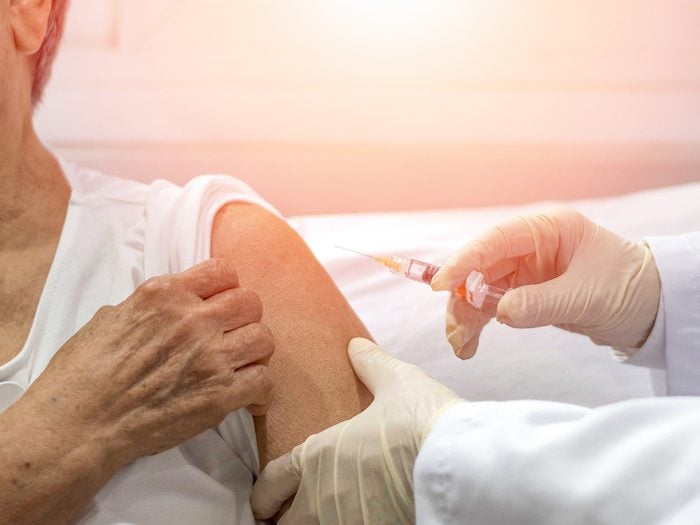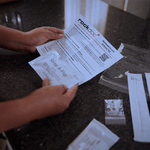Is There a Link Between COVID Vaccines and Shingles? What Experts Want You to Know

There have been reported cases of shingles after COVID vaccines, so we spoke with UBC’s Dr. Fawziah Lalji to learn more.
Canadians are well on our way to becoming fully vaccinated.
With COVID-19 vaccines now available to kids between ages 5 and 11, more than 78 percent of Canadians have received at least one dose of their COVID vaccine. At the time of publication, three quarters of the country’s entire population is fully vaccinated. And as the public health officials navigate the new Omicron variant, Canadians may be headed for a third dose of the COVID-19 vaccines.
There is no question that the vaccines save lives and are essential tools, in addition to public health measures, to combating the ongoing COVID-19 pandemic. Commonly reported vaccine side effects include headache, tingling or prickling, pain at the vaccination site and some Canadians experienced redness, hives, fatigue or fever.
There have been multiple cases of individuals experiencing shingles—a painful skin rash caused by the same varicella-zoster virus responsible for chicken pox—after receiving COVID-19 vaccines. But UBC pharmaceutical sciences professor Dr. Fawziah Lalji warns there is no conclusive evidence that COVID vaccines causes shingles. In fact, she notes that experiencing shingles after a vaccination has been documented following inactivated vaccines ranging from the flu shot to rabies and yellow fever.
We spoke with Lalji to clarify what we know so far about COVID vaccines and shingles. Here’s what she wants you to know.
Based on the current research, what do we know so far about the connection between the COVID vaccines and shingles?
Both chickenpox and shingles are caused by the same virus, the varicella zoster virus (VZV). After a person has had chickenpox, the virus rests in the body’s nerves permanently as it cannot be eliminated. For many people, it remains dormant in the nerve roots, but approximately 30 percent of all people who have been infected with chickenpox will later develop herpes zoster, commonly known as zoster or shingles.
The two biggest risk factors for reactivating the virus is age (particularly after the age of 50 years) and people with an immune system that is not working properly because of their medical conditions or medications. These two categories of individuals are also the ones we are targeting with the COVID-19 vaccine because they are also at risk of complications from the COVID-19 virus.
In other words, the populations who are receiving the COVID-19 vaccine are also the ones who are at risk for shingles reactivation, and so it’s possible that they would have reactivated anyway. Another hypothesis which has yet to be proven by science, is that activation of the immune system after getting the COVID-19 vaccine triggers the shingles flareup. This phenomenon can occur with other autoimmune diseases as well such rheumatoid arthritis.
(Related: Shingles Appears to Be on the Rise in Canada. Here’s Why.)
So, is it fair to say that shingles is a possible side effect of COVID vaccines?
Yes, shingles is considered a side effect of the vaccine. As a recent systematic review of research on COVID-19 vaccination and shingles concluded: There is not yet an established definite link but there may be possible association between COVID-19 vaccine and shingles. Large-scale studies may help to understand the cause-effect relationship.
Does it matter what COVID vaccine, or what mix of vaccines, people receive?
No. Shingles reactivation post COVID-19 vaccine have been reported after most of the current available vaccines on the market. The United States Vaccine Adverse Event Report System (VAERS) reported 2,607 cases after Moderna, 3,786 cases after Pfizer-BioNTech and 336 cases after Janssen. That is a total of 6,774 cases of shingles out of 453.9 million doses given (incidence 14.9 per million). The majority of cases were reported after the first dose and on average, after seven days post-COVID19 vaccination; cases have occurred in men and women equally.
As Canadians prepare for a possible third dose, what can Canadians do to limit their risk of shingles after COVID vaccines?
As you prepare for your third dose, you may want to talk to your health-care professional about getting the Shingrix® vaccine. This product, which is given as two doses, has been shown to reduce the risk of getting shingles and post-herpetic neuralgia (a type of severe pain that lasts months to years after shingles) by more than 90 percent. The National Advisory Committee for Immunization (NACI) recommends the shingles vaccine for everyone over the age of 50 years, including those who have had shingles disease and those who are not sure if they had chickenpox infection in the past. Your health-care provider can recommend when you should receive the vaccine around your COVID-19 shot




